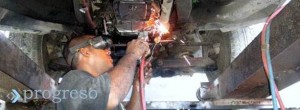
The auto-body specialist
Can moral damage to people and society be repaired?
HAVANA – I think the title of this article could serve as an element for a good police novel. And it wouldn’t be far from reality. Until a few days ago, many auto-body specialists, those men who repair damaged vehicles, broke the law and drew others into the illegality. The implicated people and the people who implicate them have created a dynamic that feeds upon itself as it grows.
For decades, the auto-body repairmen and the private practice of auto-body repair (like so many other trades) were banned. But the work was done in the light of day. Anyone who needs an exhaust pipe repaired needs only to tour the neighborhoods in this city and he’ll see small shops with car ramps and two or three repairmen at work.

They have been providing their services for years without difficulty, finding the necessary materials here and there. Suddenly, that reality changed recently with the announcement of an official Resolution that legalizes such activity.
“To repair a car or a truck you need oxygen, acetylene, sheet metal, welders’ sticks of various calibers, welders’ goggles and welding guns,” says Lázaro, a midsize black man, 76, who wears glasses and has spent 40 years in the business. He has a large scar on the nose and another, smaller but visible, over the left eyebrow.
“That’s from the time I went into boxing,” he explains, smiling. His hair is close-cropped, his ears are pointy, his lips are thin and his speech is measured.
“But none of that stuff was sold on the market,” he continues. “I had to ‘resolve’ under the table, as the saying goes. If not, why are so many ‘almendrones’ still rolling on the streets?” He used the Cuban word for cars built in the 1940s and ’50s.
“In many cases, I had to rebuilt whole floors and parts of the body,” Lázaro added. Now retired, he tells me his story, omitting details of how he worked and where.
“I worked as an auto-body welder for a company for many years,” he says. “The same I worked on cars as in trucks and also equipment that needed electric soldering. I had everything and when I ran out of something I went to the [company’s] warehouse. I also fixed the manager’s personal car, as well as the cars of some of his friends and family, which was always growing,” he adds, smiling.
“Between family and ‘sociolismo’ [tit-for-tat favors], the manager gradually started to look the other way and I was able to bring some cars into the shop on my own, to repair them for my benefit.”
“Did the manager know this?” I asked.
“Of course he did. Who would argue with him? Everybody below his rank kept quiet,” Lázaro said, adjusting his glasses, which were sliding down his nose.
“Look, all the materials, all of them, even the 2- and 3-millimeter sheet metal used for old cars, everything came out of the warehouse. I requisitioned them as if they were for our equipment, for our company or our manager, and that’s how they were issued. The warehouse chief signed them out of the stock. I felt sorry for him, but he later ‘dipped’ into the stock himself, removing other parts and materials for his benefit. That’s how it was.”
The string of favors made at the expense of the company created an economic deficit and implied a rerouting of resources, and the falsification of documents that could lead to other fraudulent operations affecting the stocks. That, in turn, would lead to accounting “adjustments” that involved workers and executives.
Was that all? Those practices – known by the rest of the employees – demoralized the workers and permeated the entire structure and business operations. Man and morals, worker and decency were in crisis.
Lázaro did not stop at doing “extra” chores while at work. “I set up a small shop outside the city and supplied myself with the company’s resources,” he says. “However, I didn’t overdo it and managed to fix a large number of private cars.”
“Weren’t you afraid that the police might show up someday?”
“Of course I was, but I was more concerned about the tin roof of my house, which was full of holes. Every time it rained, my house flooded, and I was afraid the roof might fall on our heads. I had to ‘resolve’ that problem and a new tin roof was expensive back then.”
“I know that what I did was wrong,” he admits, “but life has other rules and the new law that you mentioned didn’t exist then. If it had existed, things would have been different.”
If Lázaro experienced an ethical crisis, he doesn’t say. I wrote down his words, but his gestures were more eloquent. He said them lowering both his voice and his head. I had to listen carefully to catch his words.
“Authorizing private auto-body work and setting up stores for the materials seems very good to me,” he says, referring to the newly promulgated Resolution. “A pity that it came too late for me.”
The expression “too late for me” makes me think about the relationship between bureaucratic time and biological time. Apparently the speeds of the promulgation of laws and the enactment of changes and updates don’t match the speed of lives that need those laws and updates to improve.
How about the life of the whole of society? Can this Resolution, promulgated just a few days ago, which, like other existing and future laws, opens spaces that benefit everyone, repair the damage caused to the morals of the people, to the labor collectives, and to the enterprises and institutions that have had to coexist with so many prohibitions?
I hope it can.
Progreso Semanal/ Weekly authorizes the total or partial reproduction of the articles by our journalists, so long as source and author are identified.

